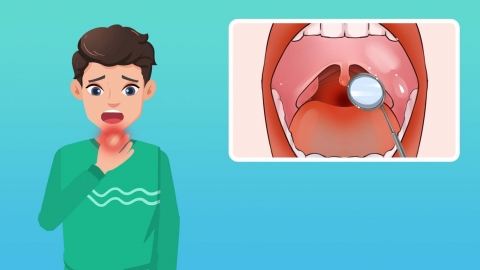What causes phlegm in the throat?
Generally speaking, the throat refers to the pharynx. Possible causes of phlegm in the throat include increased mucus secretion, weakened swallowing function, common cold, bronchitis, chronic pharyngitis, and others. It is recommended to seek timely medical attention to determine the cause and receive appropriate treatment under the guidance of a professional physician. Detailed analysis is as follows:

1. Increased Mucus Secretion
The mucous membranes in the throat secrete mucus to maintain moisture and cleanliness. When exposed to external irritants, the mucosa may overreact and secrete excessive mucus, resulting in a sensation of phlegm in the throat. It is recommended to maintain humid indoor air and avoid prolonged exposure to dry or polluted environments.
2. Weakened Swallowing Function
Swallowing helps clear phlegm from the throat. When swallowing function weakens, phlegm may remain in the throat, causing a sensation of phlegm. Maintain a balanced diet and avoid excessively dry or sticky foods; regularly check oral and throat health.
3. Common Cold
A common cold may be caused by viral or bacterial infections, such as rhinovirus, coronavirus, influenza virus, etc. Respiratory mucous membranes become congested and swollen, with increased secretions, leading to phlegm in the throat. Symptoms such as runny nose, cough, and fever may also occur. Treatment may include medications such as oseltamivir capsules, amoxicillin capsules, and acetaminophen tablets, under a doctor's guidance.
4. Bronchitis
Bronchitis may be caused by infections such as viruses, bacteria, or mycoplasma. The bronchial mucosa becomes congested and swollen with increased secretions, resulting in excessive phlegm in the throat. Accompanying symptoms may include coughing, wheezing, and difficulty breathing. Treatment may include medications such as dextromethorphan hydrobromide tablets, ambroxol hydrochloride oral solution, and cefradine capsules, as recommended by a physician.
5. Chronic Pharyngitis
Chronic pharyngitis is usually caused by repeated episodes of acute pharyngitis, long-term smoking and alcohol consumption, or inhalation of harmful gases. The pharyngeal mucosa becomes congested and swollen with increased secretions, leading to a sensation of phlegm in the throat. Symptoms may include dryness, burning sensation, and mild pain. Follow medical advice to use medications such as compound borax mouthwash, cydiiodine lozenges, and menthol throat tablets for treatment.
To prevent this symptom, it is recommended to maintain humid indoor air by using a humidifier or placing a water basin indoors to reduce irritation from dry air to the throat. Maintain a balanced diet and adequate nutrition; engage in moderate exercise to strengthen physical health.







